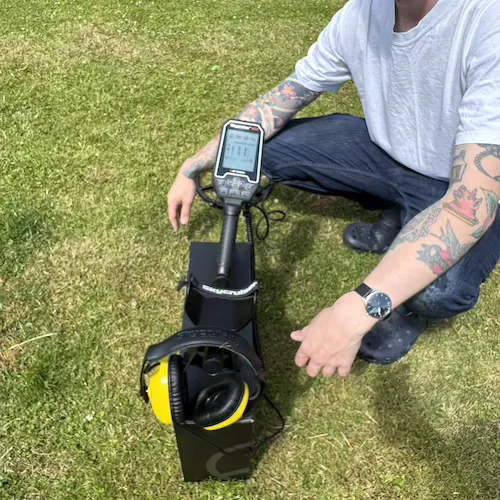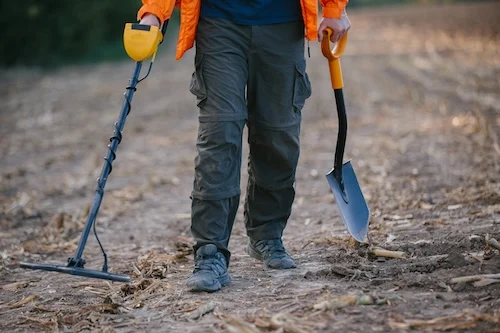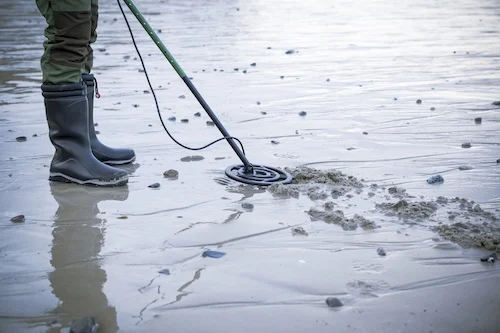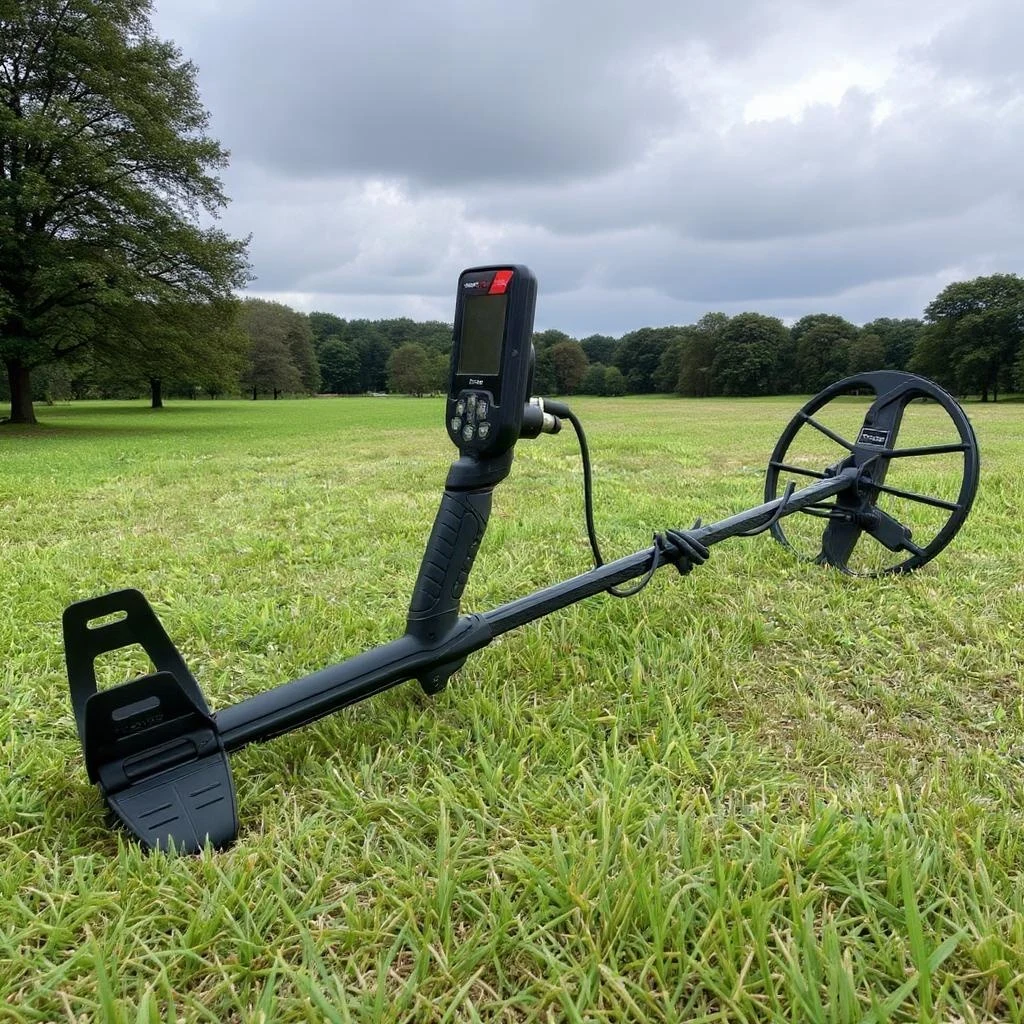Can You Metal Detect on UK River Banks? A Guide to Permissions

Written by Piotr Lesniewski
Detectorist • Scotland
As an Amazon Associate we earn commission from qualifying purchases. Read our full Affiliate Disclosure.
You've spotted that perfect riverbank location and you're eager to start swinging your detector. But before you take a single step onto that muddy shore, you need to understand the complex web of ownership laws and permissions that govern UK waterways.
Key Takeaways
- Metal detecting on UK riverbanks requires written permission from landowners, riparian owners, and potentially local authorities before beginning.
- Crown Estate permission is mandatory for detecting along tidal rivers and foreshore areas, with applications requiring detailed location information
- Detecting is strictly prohibited in protected areas including SSSIs, scheduled monuments, nature reserves, and MOD land along waterways
- All treasure finds must be reported to the local coroner within 14 days and recorded through the Portable Antiquities Scheme
- Environmental protection is required including avoiding habitat damage, filling holes completely, and respecting wildlife during sensitive periods

The reality is that detecting on riverbanks isn't as straightforward as it might seem. Making the wrong assumption about access rights could land you in serious legal trouble.
Understanding Riverbank Ownership and Permission Requirements
Before you can legally metal detect along any riverbank in the UK, you must understand that these areas have complex ownership structures that aren't immediately obvious.
Riverbanks typically belong to adjacent landowners up to the water's edge, while the riverbed itself often has separate ownership through riparian rights. The Crown Estate may own certain sections, particularly along tidal waters and major rivers.
You'll need written permission from multiple parties: the landowner of the bank you're accessing, the riparian owner of the riverbed, and potentially local authorities.
Don't assume public footpaths grant detecting rights – they only provide passage access.
Rivers like the Thames have specific regulations through organizations like the Port of London Authority. Always verify ownership through local councils or Land Registry searches before detecting.

Metal Detecting on Private Riverbanks and Non-Tidal Waters
Private riverbanks along non-tidal waters present unique opportunities for metal detecting. But they're also where permission requirements become most stringent.
You'll need written consent from the landowner before detecting on any privately-owned riverbank. These areas often hold significant archaeological potential since rivers served as ancient highways and settlement locations.
Don't assume you can detect simply because the area appears unused or abandoned. All land in England and Wales has an owner, even if it's unclear who that might be.
Contact local councils, estate agents, or farmers to identify ownership. Many landowners are receptive to requests if you're respectful and offer to share interesting finds.
Remember that water rights may differ from land ownership, so clarify permissions for both riverbank and riverbed access.

Crown Estate Permissions for Tidal Rivers and Foreshore Areas
When rivers meet the sea and tidal waters begin, you're entering Crown Estate territory where different permission requirements apply.
The Crown Estate manages most of England's foreshore and seabed, including tidal sections of rivers where saltwater influence occurs. You'll need written permission from The Crown Estate before metal detecting on these areas.
Their online application system requires details about your proposed detecting location, dates, and experience level. Permission isn't automatically granted – they'll assess each request individually.
Be aware that some foreshore areas have additional restrictions due to environmental protections, shipping channels, or archaeological significance. You're also required to report any finds over 300 years old to relevant authorities.
Always verify tidal boundaries, as they're not always obvious and can extend surprisingly far inland.

Prohibited Areas and Protected Sites Along Waterways
Beyond Crown Estate permissions, numerous waterway locations remain completely off-limits to metal detecting regardless of authorization.
You cannot detect in Sites of Special Scientific Interest (SSSIs), which protect unique ecosystems along many rivers. National Nature Reserves and Special Areas of Conservation also prohibit detecting activities.
Ancient monuments and scheduled archaeological sites frequently border waterways, making these zones strictly forbidden. You'll find many medieval bridges, Roman ruins, and historic settlements along rivers that carry legal protection.
Military training areas and Ministry of Defence land often encompass river sections, particularly in remote regions. Local nature reserves managed by county councils typically ban detecting to preserve wildlife habitats.
Always check online maps for designated protected areas before visiting any waterway location, as penalties for unauthorized detecting can include significant fines.

Legal Obligations for Recording Finds and Environmental Considerations
Discovering artifacts during riverside metal detecting automatically triggers several legal responsibilities that you must fulfill regardless of the find's apparent value.
You're legally required to report potential treasure finds to your local coroner within fourteen days under the Treasure Act 1996.
Additionally, you must record all discoveries through the Portable Antiquities Scheme, helping archaeologists understand Britain's historical landscape.
Environmental protection demands equal attention during your detecting activities. You can't damage riverbank vegetation, disturb wildlife habitats, or alter watercourse structures.
Fill all holes completely and remove any litter you encounter. Respect spawning areas during fish breeding seasons and avoid detecting during nesting periods for riverbank birds.
These obligations aren't optional—they're essential for preserving Britain's archaeological heritage and natural ecosystems for future generations.
Conclusion
You can metal detect on UK riverbanks, but you'll need proper permissions first.
Always get written consent from private landowners and check if you need Crown Estate approval for tidal areas. Don't detect in protected sites or SSSIs, and you must report any treasure finds while recording all discoveries.
Follow environmental guidelines to avoid damage. With the right permissions and responsible practices, you'll enjoy legal and rewarding riverbank detecting adventures.
Author Profile

Piotr Lesniewski
"Digging up the past, one signal at a time."
Polish-born, Scotland-based, and obsessed with the beep. My passion began decades ago, exploring fields with my Dziadek (grandfather). Now, with over 10 years of digging under my belt, I'm here to share everything I've learned—unfiltered and unbiased—to help you unearth your own piece of history. No sales pitches, just real field experience.